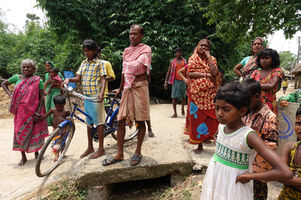
INDIA
Seekers
young, curious, ambitious
16% of India | 155 million
Seekers are younger women and some men who are typically in casual employment or with a dependent status. They are open to new ideas and taking risks, but do not use financial tools frequently. They learn through one-to-one and family interactions and are less like to use technology in both finance and daily life due to low access.
Seekers
India Average
INCOME
self-employed
N/A
N/A
formally employed
N/A
N/A
EDUCATION
no education
17%
20%
up to tertiary
N/A
N/A
PHONE
own smartphone
23%
31%
feature phone
60%
61%
LAND
own land
45%
54%
have access to land
N/A
N/A
GENDER (FEMALE)
79%
47%
AGE (18-24)
15%
18%
GEOGRAPHY (RURAL)
62%
73%
SOCIOECONOMIC
41%
SES 1-2
FORMAL ACCOUNT
OWNERSHIP
32%
38%
INFORMAL
FINANCIAL USAGE
18%
20%
MOBILE WALLET
OWNERSHIP
2%
8%
TECH USE
(LOWEST FREQUENCY)
72%
62%
CONTEXT
Who are they?
“We should look after our parents. Our mother has brought
us up and we should look after her as she is getting aged.”
PUJA
SOCIOECONOMIC STATUS (SES)

Seekers
India
Seekers are the youngest of the segments and and slightly more educated than the average. 45% of Seekers have had average access to secondary and tertiary education. 67% of women fall into the segment, and do not tend to be the financial decision makers of the household.
27% of Seekers report that they make the household decisions themselves, which is among the lowest of the segments and in line with Seekers’ novice status as financial decision makers. Seekers are much more likely to rely on their spouse (41% report a spouse making decisions) and 24% report that others take charge, which, considering Seekers’ youth and dependency on family, is likely to be the nuclear or extended family.
HOUSEHOLD DECISION MAKING

Seekers
India
ASPIRATIONS
What do they want?
Seekers aspire to stand on their own feet and contribute to their families through jobs, education and leadership in their communities. They want to try new things, with advice from their trusted advisors, particularly family.
BEHAVIOR
How do they manage their finances?
“You should be able to live with what you have, not from loans.
I see what’s in my pockets, not the price.”
PUJA
Seekers’ overall financial health is different to the average for India. Although they have average income volatility due to their reliance on casual work and family, they are much less likely than the India average to have and to save with any type of financial service provider. Seekers are new to formal finance, with only 24% of Seekers saving with a formal bank account monthly. They are good candidates for building expense management behaviors.
INCOME STABILITY

Seekers
India
SAVINGS WITH FAMILY OR AT HOME

Seekers
India
25% of Seekers put aside money once every three months with their family and 20% at least once a month to manage and meet daily expenses, which is in line with the India average. This is intuitive given their reliance on their family as trusted support.
Despite their youth, Seekers are middling to low users of virtually all forms of technology and news or entertainment. They have below-average access to smartphones with only 37% having access to smartphones themselves. 13% of Seekers have average to a common-property phone, which is slightly higher than average. As a result of their generally low smartphone access, Seekers use digital technologies infrequently, with 72% reporting low technology use.
The low smartphone usage is surprising given their youth, which may suggest that issues such as accessing or affording network credit, or even gender-based constraints may be at play. Instead, Seekers tend to use basic phones for receiving calls, with more than 59% reporting that receiving calls is their primary use of their phone.
TECH USE FREQUENCY

Seekers
India
PSYCHOLOGY
How do they think?
"You should be able to live with what you have, not from loans.
I see what’s in my pockets, not the price."
PUJA
Seekers have a sense of self regard and belief in themselves and an average sense of agency. More than half of Seekers feel highly confident with a hopefulness about the future when it comes to being financially independent and taking responsibility of their families through jobs, education and leadership in their community. Despite their self-confidence, they have a slightly lower perceived sense of control over their lives, seeing their circumstances as a potential hindrance to fulfilling their aspirations. Nevertheless, their self-esteem and positive disposition may propel them to change their perceptions of their agency over time.
LOCUS OF CONTROL

Seekers
India
CONSCIENTIOUSNESS
CONSCIENTIOUSNESS

Seekers
India
Seekers are somewhat deliberate, goal-oriented savers, with 43% reporting high to highest levels of conscientiousness, slightly more than the India average. Given Seekers’ lack of engagement in formal finance, they are yet to hone and develop their financial discipline and expense management, but have a sound foundation to build upon in the future.
Seekers heavily trust and use information discussed within their familial compared to other sources. Of all the segments, Seekers rely the most on family as a source of financial information, with 57% recently relying on family compared to the national average of 50%. However, they are less likely than others to rely on friends, with only 17% of Seekers relying on friends compared to national average of 20%. Seekers are slightly more likely to use the television as a source of information with 13% reporting a reliance on it.
SOURCES OF INFORMATION

Seekers
India
INFLUENCE

Seekers
India
Seekers do not display strong trends around being a source of information in the community with 45% of Seekers reporting that they are the first to hear important news in the community, similar to the national average of 46%.
Due to lack of involvement in finances and new status to formal finance, Seekers do not rely on others (e.g. family, friends) with them to review financial information with 64% reporting a low reliance on others compared to the national average of 56%.
RELIANCE

Seekers
India
WHEN APPLYING FOR A LOAN, THE GENDER
OF THE APPLICANT DOES NOT INFLUENCE
WHETHER THE LOAN IS GRANTED
Seekers
India
Seekers have slightly higher trust in banks than the average with 46% reporting high to highest level of trust in banks. This trust in banks over media may be driven by their general respect for authority, and family institutions.
USER PROFILE
Puja

“I want to stand on my own two feet and
show everyone that I am doing something or
other for everyone, no matter how small it is.”
—
Puja is a young 18-old year old women who lives with her husband in Murshidabad. She helps her father cultivate paddy as a laborer, but has a long term goal of becoming a teacher, although she does not know she will save the 1 lakh she will need for the fees. Puja studied up to grade 10 and then got married. She is now eager to continue her studies. She currently helps her father cultivate paddy as laborers on someone else’s land, for which they earn about ₹ 5000 every six months. The family also raises goats and cattle for milk and keeps a small vegetable plot. Puja’s main motivation in life is to look after her parents and repay them for their investment in her. To this end, Puja sees education as her main asset in life and is keen to study further.
USER INSIGHTS
How do we onboard young
women into formal finance?
Puja aspires to be financially independent and provide for her family, but is unsure where to begin managing her finances. She needs onboarding that involves a degree of hand-holding with clear and concise communication, and guidance through complex terms and conditions.
Puja would benefit from financial education that is targeted at young women with clear and simple terms, and step-by-step lessons.
How do we build trust for new customers especially women?
Puja is slightly averse to digital finance tools and trying new schemes and products as she is new to formal finance. Financial service providers must position products to build trust before focusing on engagement and adoption.
Puja needs products and schemes that are designed for trust so that she can validate the schemes with her family.





